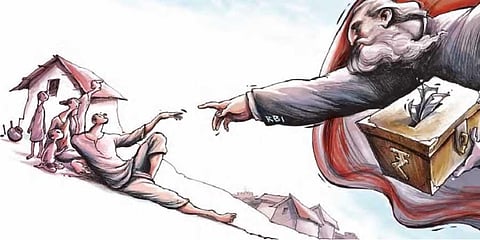

Retail inflation in India has remained continuously above 6 per cent - the Reserve Bank of India's psychological upper limit, now three months in a row. The latest data points to a consumer price index of 6.95 per cent - a steep rise compared to the 6.01 per cent and 6.07 per cent witnessed in the first two months of the calendar year. Such aggregate data in itself is worrisome; it however fails to capture some of the more intricate aspects of the iniquitous impact of inflation on the poor, vulnerable sections of the society, besides the large, informal sector.
Take the case of the rural-urban divide in inflation rates. While the retail inflation in urban India is at 6.12 per cent, the same for the rural is at a higher rate of 7.66 per cent. Food, which comprises the major spending component for a majority of the population, is experiencing a price rise with an overall inflation rate of 7.47 per cent.
However, again, the rural Indian seems to be bearing the brunt of the inflation, with food prices rising at 7.83 per cent against a 6.92 per cent urban rise. Within food, paradoxically, rural India has to pay dearly for the vegetables it produces, as evidenced by an inflation rate of 10.57 per cent, while for oils, it pays more than urban India. In fact, every item of the consumption basket (except the miscellaneous services category), costs more for rural than for urban India.
The rural poor need to be protected against such inflationary surges, especially in those commodities that constitute their essential consumption, as argued in one of my previous columns titled 'Managing the trade-off between growth and inflation'.
The Micro, Small and Medium Enterprises (MSMEs) constitute another such vulnerable segment. In a recent study in March 2022, we sought to look at the impact of inflation on this vulnerable segment. We found that more than 70 per cent of the 170 enterprises surveyed experienced inflation in excess of 13 per cent - the wholesale price inflation index for February 2022 - with many enterprises stating inflation of even 50 per cent and above.
Granular inequities existed between the service and the manufacturing sectors, with more than 90 per cent of manufacturing enterprises reporting average cost increases of 24 per cent. On the other hand, more than 75 per cent of the service enterprises experienced average operating cost increases of about 14.4 per cent. However, surprisingly, the medium sized enterprises - the larger among the MSMEs - reported higher inflationary impact, compared to the smaller enterprises.
Most SMEs are unable to make sense of the 'new normal' inflation they find themselves face to face with. The pricing strategies that most favour are cost-plus ones. It is little wonder then that faced with cost increases, most SMEs, as our survey found, cite price hike as the most favoured strategy to pass on the higher costs to the consumers.
Whether these enterprises possess the kind of pricing power that would justify such a strategy remains a moot question. Most SMEs, especially those that are in the business-to-business (B2B) segments, can't think of anything beyond pricing as a means of competitive advantage. SMEs will need to be educated on soft and hard skills, including branding, marketing, PR, finance, etc., so that they can create as well as capture value. This would require interventions by advocacy and interest groups.
Our survey also indicates the challenges for policymakers, who dream of making the manufacturing sector in India strong and resilient. A manufacturing-led growth strategy would need to keep the 6.33 crore MSMEs at the centre, especially the relatively more-efficient medium sized enterprises.
In March 2020, the government announced its ambitious Production Linked Incentive scheme that sought to incentivise companies on incremental sales from products manufactured in domestic units. The aim was to boost domestic manufacturing and cut-down India's import bills in the process.
The scheme seeks to provide incentives to high-growth sectors with huge dependence on imports in their value chain, and relatively lower domestic base. About 50 per cent of the 350 enterprises that have received approvals so far under the scheme are from the SME sector - mainly in the mobile, telecom and pharma industries.
However, with global inflation being high, it remains to be seen how far such manufacturing enterprises will be able to generate sufficient incremental sales year-on-year for the next five years under the inflationary environment, so as to qualify for the sops and incentives.
With fuel and energy prices, and that of commodities driving up prices, the government would need to think of placing a price cap and/ or provide subsidies on the energy and fuel consumed by the MSME sector, and also certain crucial raw materials. Such a cushion against global inflation would be necessary to help the MSMEs generate continued incremental sales.
The recent statement from the RBI indicates a gradual move towards tightening monetary policy. While such a stance may be necessitated at a general economy level, it is not yet time to unwind the monetary stimuli measures aimed at the MSME sector.
The RBI may need to continue with providing greater access to credit to the SME sector, in order to take care of their financing needs.
The government, on its part, may partner with and incentivise large enterprises, so that SMEs get access to the required hard and soft skills and expertise to help in capacity and capability-building. An inflationary environment will need an inflated/ additional attempt on the part of the government to protect the vulnerable income groups and small enterprises.
(The author, whose views are personal, is Professor, Economics and Executive Director, Centre for Family Business & Entrepreneurship at Bhavan’s SPJIMR. She can be reached at tulsi.jayakumar@spjimr.org)